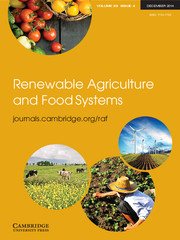Crossref Citations
This article has been cited by the following publications. This list is generated based on data provided by
Crossref.
Parga Dans, Eva
Alonso González, Pablo
and
Macías Vázquez, Alfredo
2019.
Taste and Knowledge: the Social Construction of Quality in the Organic Wine Market.
Human Ecology,
Vol. 47,
Issue. 1,
p.
135.
Alonso González, Pablo
and
Parga-Dans, Eva
2020.
Natural wine: do consumers know what it is, and how natural it really is?.
Journal of Cleaner Production,
Vol. 251,
Issue. ,
p.
119635.
Alonso González, Pablo
and
Parga-Dans, Eva
2020.
Vino de Tea (pine heartwood wine) from La Palma (Spain): ethnographic and physic-chemical characterization of a unique fermented product.
Journal of Ethnic Foods,
Vol. 7,
Issue. 1,
Alonso Gonzalez, Pablo
Parga-Dans, Eva
Arribas Blázquez, Paula
Pérez Luzardo, Octavio
Zumbado Peña, Manuel Luis
Hernández González, María Mercedes
Rodríguez-Hernández, Ángel
Andújar, Carmelo
and
Peña-Fernández, Antonio
2021.
Elemental composition, rare earths and minority elements in organic and conventional wines from volcanic areas: The Canary Islands (Spain).
PLOS ONE,
Vol. 16,
Issue. 11,
p.
e0258739.
Parga-Dans, Eva
Alonso González, Pablo
and
Otero-Enríquez, Raimundo
2022.
The role of expert judgments in wine quality assessment: the mismatch between chemical, sensorial and extrinsic cues.
British Food Journal,
Vol. 124,
Issue. 12,
p.
4286.
Alonso González, Pablo
Parga Dans, Eva
and
Fuentes Fernández, Rosana
2022.
Certification of Natural Wine: Policy Controversies and Future Prospects.
Frontiers in Sustainable Food Systems,
Vol. 6,
Issue. ,
Elrick, Will
Luke, Hanabeth
and
Stimpson, Kerrie
2022.
Exploring opportunities and constraints of a certification scheme for regenerative agricultural practice.
Agroecology and Sustainable Food Systems,
Vol. 46,
Issue. 10,
p.
1527.
Alonso González, Pablo
Parga Dans, Eva
Acosta Dacal, Andrea Carolina
Zumbado Peña, Manuel
and
Pérez Luzardo, Octavio
2022.
Differences in the levels of sulphites and pesticide residues in soils and wines and under organic and conventional production methods.
Journal of Food Composition and Analysis,
Vol. 112,
Issue. ,
p.
104714.
Vázquez, Alfredo Macías
and
del Moral, José Antonio Morillas
2022.
Ethical Values in a Post-Industrial Economy: The Case of the Organic Farmers’ Market in Granada (Spain).
Journal of Agricultural and Environmental Ethics,
Vol. 35,
Issue. 2,
Ringeval-Deluze, Aurélie
2023.
Les stratégies environnementales des producteurs de champagne.
Revue Française de Gestion,
Vol. 49,
Issue. 313,
p.
59.
Alonso González, Pablo
and
Parga‐Dans, Eva
2023.
The natural wine phenomenon and the promise of sustainability: Institutionalization or radicalization?.
Culture, Agriculture, Food and Environment,
Vol. 45,
Issue. 2,
p.
45.
Das, Naba Kumar
and
Roy, Arup
2023.
Systematic mapping study of literature in organic food value chain (1990–2021).
Journal of Agribusiness in Developing and Emerging Economies,
Nayak, Swayangsiddha
Campbell, Julie
and
Duffey, Kate Cassity
2024.
Utilizing Q methodology to explore university students’ perceptions of the organic food industry: the integral role of social media.
Frontiers in Communication,
Vol. 9,
Issue. ,
Oliveira, Magnólia Abreu de
Machado, Guilherme Almeida
Pereira, Marcos Severiano
and
Pantoja, Maria Júlia
2024.
Inovações na agricultura orgânica: revisão sistemática e bibliométrica de literatura.
Revista de Economia e Sociologia Rural,
Vol. 62,
Issue. 2,
Alonso González, Pablo
Parga Dans, Eva
Hernández González, María Mercedes
Arribas Blázquez, Paula
Acosta Dacal, Andrea Carolina
and
Pérez Luzardo, Octavio
2024.
Unveiling terroir: evaluating the magnitude of the heterogeneity and its main drivers in the Canary Islands wines.
Cogent Food & Agriculture,
Vol. 10,
Issue. 1,


